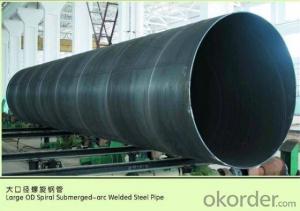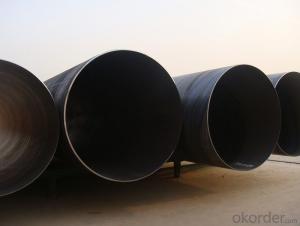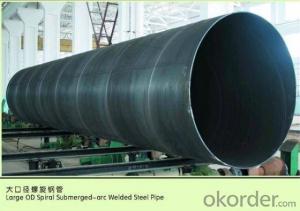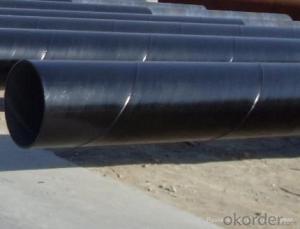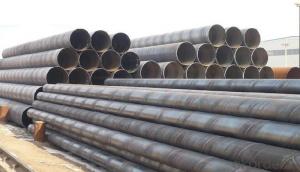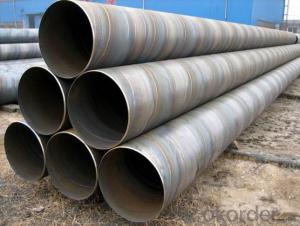SPIRAL STEEL PIPE 56’‘ 60’‘ LARGE DIAMETER PIPE
- Loading Port:
- Tianjin
- Payment Terms:
- TT OR LC
- Min Order Qty:
- 5 m.t.
- Supply Capability:
- 3000 m.t./month
OKorder Service Pledge
OKorder Financial Service
You Might Also Like
Packaging & Delivery
Packaging Detail: | standard export packing or as customer's requirement |
Delivery Detail: | within 10 - 30 days |
Specifications
Spiral Welded Steel Pipes and Tubes
1.Material:Q195-Q235
2.Length:1-12m
3.WT:1.0-14mm
4.O.D.:20-273mm
Spiral Welded Steel Pipes and Tubes
Product Description:
1.Material : Q235,Q345,L245,L290,L360,L415,L450,L485,GrB,X42,46,X52,X56,X60,X65,X70,X80,X100
2,Standard: SY/T5037-2000,GB/T9711-2011,API Spec 5L PSL1/PSL2,ASTM A252\A53,ISO3183,DIN17172,EN10217,JIS G3457,AWWA C200,ASTM A139,ASTM A671,ASTM A672
3.Wall thickness: 3.0mm-30mm
4.Outer diameter: φ168mm-3020mm
5,Length: 5m-12m or as your requirement
6,Corrosion protection standard: DIN30670,DIN30671, AWWAC210, AWWA C203, SY/T0413-2002,SY/T0414-2002
7,Application: Oil, gas, natural gas, water pipe, thermal electricity pipe, steel structure engineering, etc
Q195-q345 Material Steel Pipe's Materials
Elements | Chemical Compsition% | Mechanical Property | ||||||
C% | Mn% | S% | P% | Si% | Yield Point (Mpa) | Tensile Strength(Mpa) | Elongation | |
Q195 | 0.06-0.12 | 0.25-0.50 | <0.050< span=""> | <0.045< span=""> | <0.030< span=""> | >195 | 315-430 | 32-33 |
Q215 | 0.09-0.15 | 0.25-0.55 | <0.05< span=""> | <0.045< span=""> | <0.030< span=""> | >215 | 335-450 | 26-31 |
Q235 | 0.12-0.20 | 0.30-0.70 | <0.045< span=""> | <0.045< span=""> | <0.030< span=""> | >235 | 375-500 | 24-26 |
Q345 | <0.20< span=""> | 1.0-1.6 | <0.040< span=""> | <0.040< span=""> | <0.55< span=""> | >345 | 470-630 | 21-22 |
- Q: What are the common sizes of steel pipes available?
- The common sizes of steel pipes available vary widely depending on the application, but some standard sizes include 1/8 inch, 1/4 inch, 1/2 inch, 3/4 inch, 1 inch, 2 inch, 3 inch, 4 inch, 6 inch, 8 inch, 10 inch, 12 inch, 14 inch, 16 inch, 18 inch, 20 inch, 24 inch, 30 inch, 36 inch, 42 inch, 48 inch, 60 inch, and 72 inch.
- Q: Can steel pipes be used for marine applications?
- Yes, steel pipes can be used for marine applications.
- Q: How do you calculate the bending moment of a steel pipe?
- The bending moment of a steel pipe can be calculated using the formula M = F * d, where M is the bending moment, F is the applied force, and d is the distance from the neutral axis to the point where the bending moment is being calculated.
- Q: How are steel pipes handled and transported safely?
- Steel pipes are handled and transported safely by following certain protocols. Firstly, they are properly secured and stacked in a way that prevents any movement or damage during transportation. The pipes are often bundled together using steel bands or straps to ensure stability. Additionally, specialized equipment such as cranes, forklifts, or pipe handling systems are used to lift and move the pipes with care. Adequate protective measures, such as using cushioning materials and covers, are taken to prevent corrosion or external damage. Furthermore, proper training is provided to workers involved in handling and transportation to ensure they follow safety guidelines and use appropriate lifting techniques. Overall, a combination of careful planning, secure packaging, and trained personnel contribute to the safe handling and transportation of steel pipes.
- Q: 25 of the steel pipe with 6 in charge of what is the difference?
- 25 of the steel pipe with 6 in charge of the difference:25 of the steel pipe refers to the DN25 tube, the outer diameter of 25mm; 6, in charge of refers to DN20 steel pipe, the outer diameter is 20mm.
- Q: Can steel pipes be used for underground compressed air pipelines?
- Indeed, underground compressed air pipelines can utilize steel pipes. The strength and durability of steel pipes make them a popular choice for subterranean pipelines. They possess the capacity to endure high pressure and withstand corrosion and other environmental elements. Moreover, steel pipes are renowned for their extended lifespan, rendering them a dependable option for compressed air pipelines. Nevertheless, it is crucial to guarantee the adequate coating and protection of the steel pipes to avert any potential corrosion concerns. Furthermore, the proper installation and maintenance of these pipelines are vital to ensure their efficiency and safety.
- Q: What are the common standards for steel pipe manufacturing?
- There are several common standards for steel pipe manufacturing that ensure the quality and consistency of the products. One of the most widely recognized standards is the American Society for Testing and Materials (ASTM) standard, which includes various specifications for different types of steel pipes. These specifications cover dimensions, mechanical properties, and testing requirements. Another common standard is the American National Standards Institute (ANSI) standard, which establishes guidelines for the manufacturing process, material requirements, and performance characteristics of steel pipes. ANSI standards are often used in industrial applications and construction projects. In addition to these, there are international standards such as the International Organization for Standardization (ISO) standard, which provides guidelines for the design, production, and testing of steel pipes. The ISO standard ensures that steel pipes meet global quality and safety standards. Furthermore, specific industries may have their own standards for steel pipe manufacturing. For example, the American Petroleum Institute (API) has developed standards specifically for oil and gas industry applications. These standards, such as API 5L, outline requirements for the manufacturing, testing, and inspection of steel pipes used in the transportation of oil and gas. Overall, these common standards for steel pipe manufacturing help to ensure the quality, reliability, and safety of the products. They provide a standardized framework that manufacturers can follow, enabling customers to have confidence in the performance and durability of the steel pipes they purchase.
- Q: Water, gas, steel pipes, thick steel wire means?
- Water pipes, gas pipes and other collectively known as water gas pipe, generally galvanized steel pipe, so it can be called water and gas pipe. Most of them are welded steel tubes made of low carbon steel.
- Q: How are steel pipes used in the manufacturing of geothermal systems?
- Steel pipes are used in the manufacturing of geothermal systems primarily for their strength, durability, and resistance to corrosion. These pipes are used to transport fluid, typically water or a water-based solution, from the geothermal source to the surface, where it can be utilized for heating or electricity generation. The high tensile strength of steel pipes allows them to withstand the high pressure and temperature conditions typically found in geothermal systems. Additionally, steel pipes are resistant to corrosion, which is important in preventing leaks and maintaining the efficiency of the system over its lifespan.
- Q: What are the different types of steel pipe coatings for corrosive environments?
- There are several types of steel pipe coatings that are commonly used for corrosive environments. These include fusion bonded epoxy (FBE) coating, three-layer polyethylene (3LPE) coating, three-layer polypropylene (3LPP) coating, and coal tar enamel (CTE) coating. FBE coating provides excellent corrosion resistance and is commonly used for underground pipelines. 3LPE and 3LPP coatings combine a layer of epoxy, an adhesive layer, and a polyethylene or polypropylene outer layer, offering superior protection against corrosion and mechanical damage. CTE coating, although less common nowadays, is still used for certain applications due to its resistance to water and chemical corrosion.
Send your message to us
SPIRAL STEEL PIPE 56’‘ 60’‘ LARGE DIAMETER PIPE
- Loading Port:
- Tianjin
- Payment Terms:
- TT OR LC
- Min Order Qty:
- 5 m.t.
- Supply Capability:
- 3000 m.t./month
OKorder Service Pledge
OKorder Financial Service
Similar products
Hot products
Hot Searches
Related keywords
